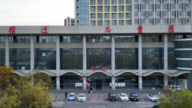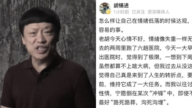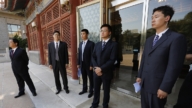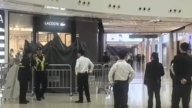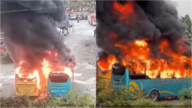【新唐人2011年12月1日讯】2010年两会期间,中共教育部曾以“政府买单费用太大”,回复人大代表对全国校车安全工程的提议。本台记者在采访中也发现,正宁县幼儿园和教育部同样,在校车安全问题方面反应冷漠。佛山小悦悦事件后,倍受拷问的中国人的良知,再次提到了人们眼前。
据2011年第46期的《中国经济周刊》报导,在2010年两会期间,全国人大代表、华中师范大学教育学院教授、长江教育研究院院长周洪宇,提交了一份《关于实施全国校车安全工程的议案》。建议让校车在行驶过程中享有一定特权。
之后,教育部给他回复说,如果在全国范围内的学前和义务教育阶段购买校车,政府需要投入3000亿的预算,而且一年的运行、维护费用为1500亿,最后的结论认为,4500亿的政府买单费用太大。
不过周洪宇认为,经费不足不是推托的借口,因为除了美国,法国,日本等发达国家,经济并不太发达的古巴、墨西哥等也建立了比较完善的校车管理体系。关键是政府想不想做的问题。
与目前校车安全引发网络讨论的热烈相反,正宁县幼儿园的有关人士也表现出了和教育部同样的漠然。
正宁县幼儿园办公室李女士:“我没有看法,我认为,当汽车产生的那一瞬间就会有肇事,就像医院设有太平间一样。(校车改革)这是政府领导的事情,我没有发言权。”
据不完全统计,2010年10月到2011年9月,一年内中国各地共发生校车事故22起,死亡人数达到47人,平均每月有4名儿童惨死在上下学的路上。
正宁县幼儿园办公室李女士:“就说它不发生在我们正宁,或许发生在什么其他地方。咱们中国车的超载,轮船超载,货车超载,运货超载,包括自行车也超载。这是一种,在中国来说我觉得是非常正常的。只不过正宁县城幼儿园这件事让媒体曝光了。”
教育部和幼儿园相关人士对涉及儿童生命安全问题的这种表态并不是第一次出现,从毒奶粉事件以来,政府的一系列处理和态度,使得学生家长在校车问题上也表示悲观。
学生家长:“我没有看法,我也不抱任何希望了。那毒奶粉事件有希望吗?汶川大地震,那个豆腐渣工程啊,那希望小学有希望吗?所以说啊,最大的希望,我是希望那些家长们好好想一想,宁可自己再多花一点钱,可能是说想其他的办法,也不要把希望寄托在什么政府部门身上了。”
2011年已近年底,如果真如温家宝日前所说,政府要加大对校车的投入,那么对校车的预算就应该在今年底写入中央和地方的财政预算,这样明年才有可能真正的推行,不过就目前情况来看似乎还没有动静。
与此形成对比的是,不久前国内媒体披露,中共各级政府在年底“突击花钱”,宁可买贵的不买对的。根据财政部的统计数据显示,今年财政部门必须在剩下的近两个月中确定超过3.5万亿财政资金的去向。
另据国家财政部、国家发改委和国家统计局调研数据显示,中共党政机关及行政事业单位公务用车总量为200多万辆,每年公务用车消费支出1500亿元至2000亿元,还不包括医院、学校、国企、军队以及超编配车,每年公务用车购置费支出“增长率为20%以上”。
新唐人记者朱善智、尚燕、王明宇综合报导。
School Bus Incident: Chinese People Have Lost Hope
In 2010, the Chinese Communist Party’s (CCP) Ministry of
Education responded to a proposal made by a People’s Congress representative,
regarding school bus standards and regulations,
saying that it would cost too much money.
Our NTD TV reporter also found that the recent school bus
tragedy that happened in Zhengning County was related to
a similar attitude of their management and educational bureau.
The latest and worst series of similar incidents involved
a Foshan City little girl named Yueyue who was run over by two vehicles.
The Chinese people’s conscience has been tested once again.
The China Economic Weekly reported in issue No.46 that
during its two 2010 meetings, People’s Congress representative,
Zhou Hongyu, submitted a report on The Implementation of
the National School Bus Safety,
suggesting that school buses should enjoy
special traffic-road privileges.
Later the Ministry of Education replied saying that the
CCP needs to invest 300 billion yuan (US$47 billion) to purchase the buses.
In addition, the annual operation and maintenance costs
would run as high as 150 billion yuan (US$23.5 billion).
The final conclusion was that the CCP didn’t want to
allocate the required resources for this project.
However, Zhou Hongyu believes that the lack of funds is not
a good enough excuse for shirking the responsibility of dealing with this most important issue.
In some developed counties such as the United States, France,
and Japan, even including some undeveloped countries
such as Cuba and Mexico, they have established an efficient
school buses management system.
The key issue is if a government wants to do it or not.
Of recent, school bus safety issues have really
stirred up netizens.
However, some people in Zhengning Kindergarten and the
local educational bureau have shown a lot of indifference.
Ms. Li works in the Zhengning Kindergarten office:
“I have no opinion, as soon as the vehicles are produced,
it would involve accident issues,
just like hospitals have mortuaries.
School bus standards and regulations are governmental decisions.
I don’t have the right to speak for the government.”
According to incomplete statistics, from October 2010 to
September 2011, 22 school bus accidents occurred in China, killing 47, with four children dying on the road, each month.
Ms. Li: “If the accident didn’t happen in Zhengning, it would
happen somewhere else.
In China, it is a common occurrence to hear about vehicle overloads,
ship overloads, lorry overloads, and also bicycle overloads.
The tragedy in Zhengning was exposed by the media.”
The educational bureau and kindergarten’s attitude regarding
school bus safety issues is not an isolated example.
Since the poison milk powder scandal, how the CCP has dealt
with things has caused parents to lose confidence regarding the school bus issue.
A parent: “I have nothing to say, I don’t have any hope.
Is there is any hope regarding the tainted milk powder scandal?
Or the earthquake in Wenchuan County, or the poor quality
construction regarding the Hope Primary School?
Is there really any reason to hope that things will get better?
The best hope is to hope that parents will think twice
before doing something and be willing to spend money on alternative ways, rather than pinning their hopes on the CCP.”
Approaching the end of 2011, Chinese Premier Wen Jiabao
said the government should increase investments in school buses,
adding that the budget for this expenditure should be included
in the government’s financial report.
This way, things could start to improve, starting next year.
However, it seems like nothing happened.
On the contrary, recently a domestic media reported that the
CCP regime, at all levels,
will spend as much money as they can by the end of the year
buying expensive goods rather than buying practical items.
According to the Ministry of Finance statistics, in December
the Ministry needs to decide how it is going to spend over 3.5 trillion yuan (US$0.55 trillion) in funds.
An official survey shows that CCP officials use about 2 million
cars, with annual expenses totalling 150 billion yuan (US$235.4 billion) to 200 billion yuan (US$314 billion),
excluding hospitals, schools, state-owned businesses, and
military vehicles.
The annual purchase of official vehicles has
increased by 20% or more.
NTD reporters Zhu Shanzhi, Shang Yan and Wang Mingyu




